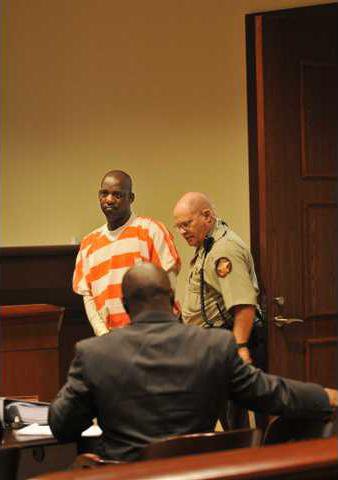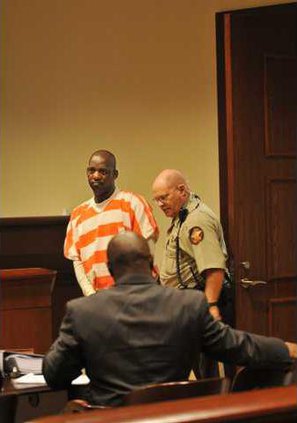JEFFERSON — A man charged in a 2006 Hoschton quadruple murder had his first substantive court hearing in more than a year Thursday, though it appears unlikely his case will go before a jury before 2010.
Henry Lee Stringer was in Jackson County Superior Court as his lawyers argued dozens of routine pretrial motions in his death penalty case.
Stringer, 35, is charged in the May 2006 deaths of Evelyn Strickland, 68; her daughter, Marvelette Strickland, 29; and two children Stringer and Marvelette Strickland had together, son J’Majuan Stringer, 4, and daughter J’Lasia Stringer, 2.
Authorities believe the two women were stabbed to death in their Pendergrass Road home, which was then set on fire. The two children died from smoke inhalation.
More than a year passed from the time of the deaths before Stringer was charged with murder. Shortly after the murders, Stringer was seriously injured when he was struck by a train. Authorities have not said whether they believe he tried to commit suicide.
Then-District Attorney Rick Bridgeman filed notice of intent to seek the death penalty against Stringer in December 2007. Current Piedmont Judicial Circuit District Attorney Brad Smith inherited the case when he won election last year.
Stringer pleaded not guilty to a 16-count indictment that includes charges of murder and arson in April 2008 and has remained in the Barrow County Detention Center without bond since.
Smith would not speculate Thursday on whether a trial date in Stringer’s case could be set for this year, but Stringer’s lead defense attorney told Superior Court Judge Joe Booth he had two other pending death penalty cases that would take up much of his time in the second half of 2009.
Christian Lamar, a lawyer with Georgia’s Office of the Capital Defender, said he has a death penalty trial set for August in Clayton County that could last four to six weeks. In October, Lamar is scheduled to represent a defendant in a capital trial in Richmond County.
Lamar estimated it would take five to seven days to argue defense motions to suppress certain evidence in Stringer’s case and to challenge the composition of the grand jury pool, a routine strategy in death penalty cases.
The defense has filed more than 100 motions in Stringer’s case, which is not atypical for a capital case in Georgia.
Among the motions argued Thursday, Lamar asked that members of law enforcement be excluded from being in the courtroom in uniform. Lamar claimed that a large show of force from courtroom security would “give the impression that Mr. Stringer is a very dangerous man, and that goes out with the jury.”
Assistant District Attorney Deborah Wilbanks countered that any measures taken by the sheriff’s office “would reflect an increased level of security” shown in all Georgia courts since convicted killer Brian Nichols shot three people to death at the Fulton County Courthouse in 2005.
Lamar argued that “Mr. Stringer is who we’re dealing with, not Brian Nichols.”
Said Wilbanks, “This is a death penalty case, and Mr. Stringer is charged with causing the deaths of four people, so we do have security concerns.”
The judge heard about the option of using an electrified, remote-controlled “react belt” in lieu of visible restraints when Stringer is seen by potential jurors.
Jackson County Sheriff’s Maj. David Cochran testified the device attaches to a defendant’s leg or arm under the clothing and has been used “in the past on high-profile cases such as this, and it has worked well.”
Lamar, Stringer’s lawyer, said the proposal seemed reasonable but he wanted to research the device before agreeing.

